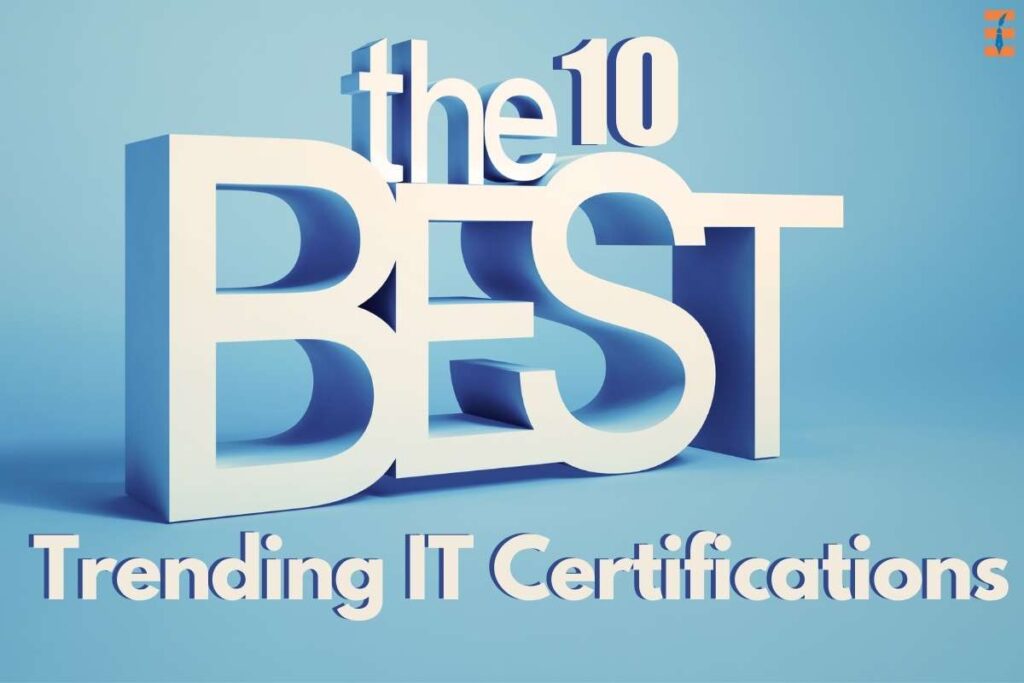Obtaining a trending IT certification is a great way to distinguish yourself from the competition and increase your earning potential. Companies have hastened their digital transformation efforts in response to the COVID-19 outbreak. More than half of IT decision-makers say it is “very difficult or extremely difficult” to hire for key IT roles, according to the Global Knowledge 2021 IT Skills and Salary survey, suggesting that the persistent IT skills gap is complicating development.
Both businesses and prospective employees are turning to certificates as a means of filling this need, with big data and analytics, cloud computing, and security credentials being particularly in demand. Up from 87% in the previous year’s research, 92% of IT workers questioned by Global Knowledge said they have at least one qualification. Sixty-four percent of IT executives estimate that qualified workers are worth an extra $10,000 or more per year compared to their non-certified colleagues.
Here are the 10 Best Trending IT Certifications:
1. Microsoft Certified: Azure Fundamentals
Validating your familiarity with Microsoft Azure’s cloud services is easy if you have the Microsoft Certified: Azure Fundamentals credential. This trending IT certification is aimed at people who are just getting started with cloud computing and Microsoft Azure. Candidates should be well-versed in a variety of areas, including but not limited to networking, storage, computing, application support, and application development. Cloud principles, Azure services, workloads, security and privacy, pricing and support, and more are all part of the certification.
2. Microsoft Certified: Azure Administrator Associate
Earning the Microsoft Certified: Azure Administrator Associate credential demonstrates your proficiency in setting up, administering, and keeping tabs on a business’s deployment of Microsoft Azure. Candidates for the test should have a thorough familiarity with the fundamentals of Azure, including its services, workloads, security, and governance, and at least six months of experience managing Azure.

In addition to trending IT certification, familiarity with PowerShell, the Azure Command Line Interface, the Azure portal, and Azure Resource Manager templates is highly encouraged. Exam topics include identity and access management in Azure, storage implementation and management, Azure compute deployment and management, virtual networking configuration and management, backup, and recovery of Azure resources, and monitoring Azure resources.
3. Microsoft Certified: Azure Solutions Architect Expert
Solution architects may show their “expertise in developing cloud and hybrid solutions that operate on Microsoft Azure, including computing, network, storage, monitoring, and security” by passing the Microsoft Certified: Azure Solutions Architect Expert exam. To go on to the expert level, you must first pass the associate-level test.
Experience and expertise in a wide range of IT operations, including networking, virtualization, identity, security, business continuity, disaster recovery, data platforms, and governance, are preferred. Microsoft has already built a new replacement exam, Designing Microsoft Azure Infrastructure Solutions, which is presently available in beta and will replace the Azure Solutions Architect trending IT certification when it is decommissioned on March 31, 2022.
4. Certified Information Systems Security Professional (CISSP)
Validating your expertise in creating, executing, and managing cybersecurity programs is the goal of the ISC’s Certified Information Systems Security Professional trending IT certification. The target audience consists of chief information security officers, chief information officers, directors of security, IT directors and managers, security systems engineers, security analysts, security managers, auditors, architects, consultants, and network architects.
Security and risk management, assets, architecture and engineering, communication and networks, IAM, assessment and testing, operations, and software development all make appearances in the exam. Candidates must have a minimum of five years of paid work experience in two or more of the eight domains included in the CISSP Common Body of Knowledge to sit for the test.
5. Certified Information Security Manager (CISM)

Earning the ISACA’s Certified Information Security Manager credential indicates proficiency in IS and IT security and control, and may pave the road to a management position in this field. Exam objectives for the Certified Information Security Manager (CISM) include knowledge of and experience with information security governance, information risk management, information security program creation and management, and information security incident management. Candidates must have five or more years of experience in IS management to take the test, while a maximum of two years of experience may be waived.
6. Google Professional Cloud Architect
To prove your competence in using Google Cloud technologies in the workplace, you may get the Google Professional Cloud Architect credential. Exam topics include designing for security and compliance, assessing and optimizing technology and business processes, managing cloud architecture deployments, and assuring solution and operations dependability. Your ability to apply corporate cloud strategy, solution design, and architectural best practices, as well as your familiarity with software development processes in multi-cloud or hybrid settings, will be validated by this trending IT certification.
7. AWS Certified Solutions Architect Professional
When you pass the AWS Certified Solutions Architect Professional exam, you prove that you have the skills to plan, implement, and assess solutions for your clients that make use of AWS resources. The AWS Command Line Interface (CLI), AWS Application Programming Interfaces (APIs), AWS CloudFormation templates, AWS Billing Console, AWS Management Console, scripting languages, and operating in both the Windows and Linux environments are all covered in the test.
You’ll require expertise in application and enterprise project architectural design best practices, as well as the ability to link such designs to business goals. Also on the table is a test of your familiarity with cloud application specifications and your skill in designing a hybrid architecture based on AWS tools and a CI/CD workflow. At least two years of practical expertise in building and delivering cloud architecture on AWS is preferred.
8. Microsoft Certified: Azure Fundamentals

Validating your familiarity with Microsoft Azure’s cloud services is easy if you have the Microsoft Certified: Azure Fundamentals credential. This certification is aimed at people who are just getting started with cloud computing and Microsoft Azure. Candidates should be well-versed in a variety of areas, including but not limited to networking, storage, computing, application support, and application development. Cloud principles, Azure services, workloads, security and privacy, pricing and support, and more are all part of the trending IT certification.
9. AWS Certified Solutions Architect Associate
To prove your proficiency in planning and executing cloud projects using AWS services, you should get the AWS Certified Solutions Architect Associate credential. Workload deployment, management, and operations on AWS, as well as security, compliance, and the AWS Command Line Interface and Management Console, are all covered in the test (CLI).
In addition to trending IT certification, the exam tests your familiarity with AWS’s networking, security services, and global infrastructure, as well as the AWS Well-Architected Framework. Candidates are encouraged to have at least a year of practical experience with AWS before taking the test. This experience should include the use of AWS compute, networking, storage, and database services, as well as AWS deployment and administration services.
10. The AWS Certified Cloud Practitioner credential
For those already familiar with AWS, the AWS Certified Cloud Practitioner exam is a great way to prove their competence. Having worked with AWS Cloud for at least six months and having a familiarity with fundamental IT services and key AWS services are all highly encouraged.
Some of the subjects tested include getting started with AWS, using AWS’s basic services, understanding the economics of the cloud, and understanding AWS security and compliance. If you are interested in expanding your knowledge about cloud computing, this is an excellent entry point.
Bottom Line:
Certification courses can validate your IT skills and experience and show employers that you have expertise in the IT field. You have a chance to take the certification in the skills you already possess or other skills you would like to put in your career and get a better job. As mentioned above you can choose any of these 10 best trending IT certification courses and strengthen your resume. They will help you to set yourself apart from other competitors in the race to get a good job.
Also Read: Top 5 Project Management Certifications

